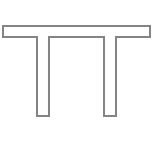Alison Williams
Credit: Thayer Gowdy, 2022
Ali Williams is a writer, educator, and creative practitioner from California, a landscape with a deep influence on her transdisciplinary work investigating the human relationship with land, more-than-humans, and each other. Her current research-based practice centers on materiality, embodiment and place, particularly in the consideration of grief as a response to environmental, collective, and personal loss.
*I acknowledge the land known as California as the ancestral and unceded territory of over 100 known Native groups. I specifically acknowledge the groups in areas that I spend time in, particularly the Chumash, Paiute, Shoshone, Mojave, Mono, and Tubatualbal peoples.
Praxis statement:
Over the past few years, I experienced a succession of great losses. It was yet another loss to realize that the words I had always depended on as a writer were no longer working to express the full depth of loss and meaning, no matter the strength of feeling. I felt the limitations of defining myself by and confining myself to one medium of expression, and wondering why I felt I had to do so. I found myself asking: When and how are words and language crucial and useful, and when are they inhibiting and obfuscating?
I began focusing on making and doing through material practices in various formats, primarily clay and ceramics, but also sound, movement, and design. I have always worked in other mediums, but considered them play. Research-based creative practice has afforded me a way into ownership of transdisciplinary expression, and the consideration of what it might mean to embrace an un-cohesive narrative.
My work has expanded into questions of tacit knowledge and tacit making, such as the realization of my keen desire to engage with objects and materials and the knowledges that they bring; and the knowledge of the body, whereby movement and motion through particular localities of time and space and place generate and displace narrative realities, and can create connections beyond time. In letting go of the expectation of the end result of a particular outcome, I am able define my way of working with and through a variety of mediums to explore my research questions through a progression of transdisciplinary projects.
Current research of interest:
How does an object-making practice that engages with the curatorial speak to the ways in which we relate to the world, to each other as humans, to landscape/place, to our more-than-human companions?
How does a practice that seeks understanding through things (materiality, embodiment, tactile substances) differ from a practice that seeks understanding through words?
How does place affect creative practice? How do we come to know a place?

